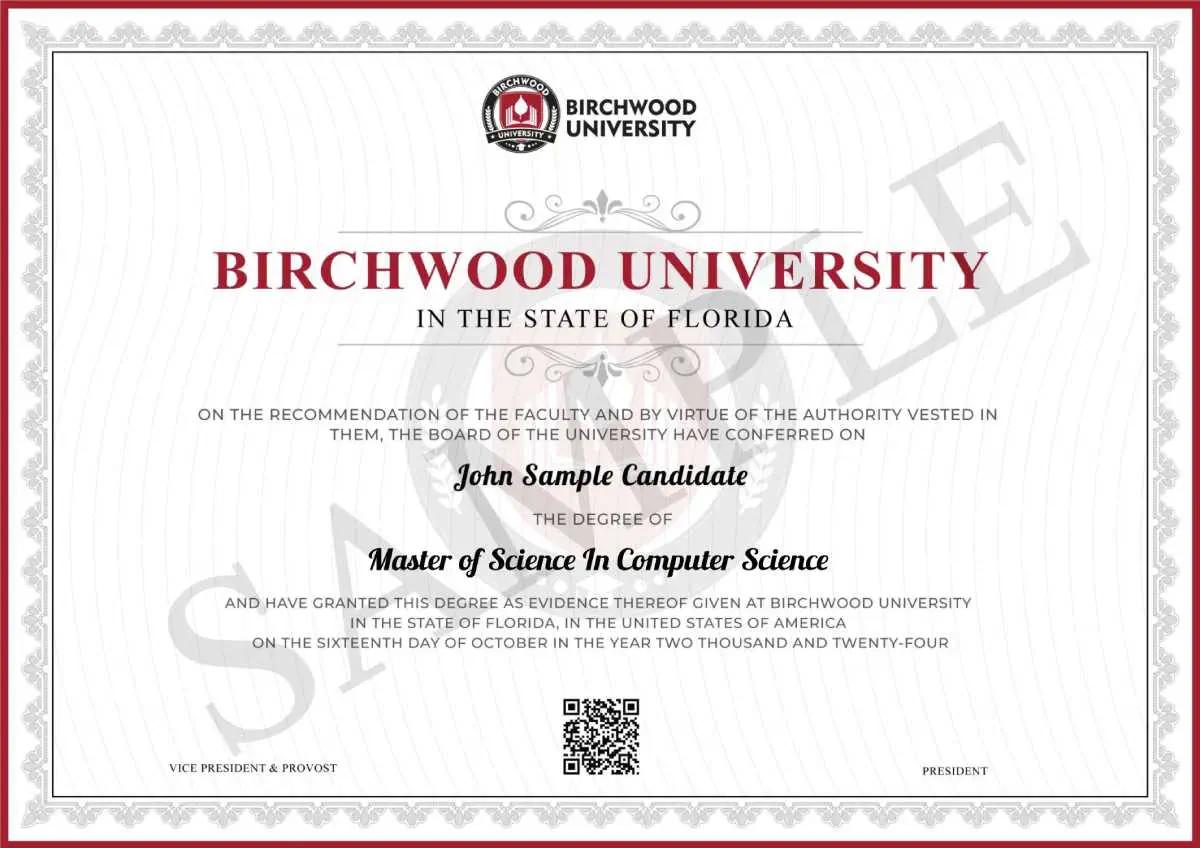Master of Science In Computer Science
Master of Science In Computer Science
The Master of Science in Computer Science Program will provide students with a solid foundation of advanced knowledge to stay updated with these advancements, as a program graduate, students can explore career paths in areas such as application development, big data analysis, software engineering, game design and programming, peer-to-peer networks, computer vision and imaging, machine learning, AI, urban computing, and interactive data visualization.

The Evolving landscape of Computer Applications
Why choose an Master of Science in Computer Science from Birchwood University?
The Master of Science in Computer Science program is designed to ensure graduates are thoroughly prepared to thrive in their specialized chosen careers and have the potential to make meaningful contributions to the field of computer science. This program equips students with advanced and up-to-date computer science knowledge with a curriculum encompassing expansive topics including algorithms, data structures, software engineering, and emerging technologies. It develops research skills and makes them potential players and contributors to the industry through original research, publications, and innovations. It enhances learners’ problem-solving skills and enables them to analyze complex issues, design efficient solutions, and implement them effectively. This program improves their communication skills, cultivates leadership qualities, inculcates critical thinking, and makes them stay relevant throughout their careers.
Admission Requirements
General Admission Requirements
- A copy of a valid government-issued photo identity card.
- A copy of an updated resume.
- Any document if not in English must be accompanied by a certified translated copy.
Additional Admission Requirements For Master of Science in Computer Science
- Submit a 500-word essay (minimum) summarizing the applicant’s interest in the Master of Science in Computer Science program outlining your professional aspirations.
- Provide an official undergraduate degree transcript verifying the completion of a bachelor’s degree in computer science, engineering, mathematics, or a related field with a cumulative GPA of 2.5 or higher.
- Provide two (2) professional recommendation letters attesting to your academic abilities and professional potential.
- Personal Interviews will be conducted with the Director of Education for applicants with a GPA below 2.5.
Your Path to Admission
We evaluate candidates for the Master of Science in Computer Science program based on their academic achievements, professional accomplishments, adaptability, and openness to innovation. Our goal is to identify motivated individuals with strong leadership potential and a passion for advancing in the field of computer science.
Step 1
Online Application
Step 2
Online Assessment
Step 3
Personal Interview
Step 4
Documents Verification
Step 5
Final Committee Decision


Admission Application and Graduation Requirements
Application For Admission
Applicants interested in pursuing the Master of Science in Computer Science at Birchwood University must complete an application form and submit it with a non-refundable application fee of $150 (through Credit Card/Bank Transfer). Payment can be made via check, money order, or credit card. Checks and money orders should be made payable to Birchwood University. Applicants must submit all required application documents to be considered for admission. Once an admission decision has been made, candidates will receive an email with further instructions. Throughout the process, candidates will be regularly contacted by their admissions representative to ensure all necessary materials are submitted promptly.
Graduation Requirements:
To graduate with a Master of Science in Computer Science from Birchwood University, students must:
- Successfully complete all required credits as outlined in the program catalog.
- Achieve a minimum cumulative grade point average (GPA) of 3.0.
- Maintain satisfactory academic progress throughout the duration of the program.
- Settle all financial obligations to the university before graduation.
Master of Science in Computer Science - Key Highlights
Earn a globally recognized online master's degree equally credible as offline.

Program Objectives
These program objectives are designed to ensure that graduates are well-prepared to excel in their chosen careers and make meaningful contributions to the field of computer science.
The objectives are as follows:
- Equip students with advanced and up-to-date knowledge in the field of computer science, covering a wide range of topics including algorithms, data structures, software engineering, and emerging technologies.
- Enhance students' problem-solving skills, enabling them to analyze complex issues, design efficient solutions, and implement them effectively.
- Develop students' research skills, enabling them to contribute to the field through original research, publications, and innovations.
- Enhance students' communication skills, enabling them to effectively convey technical information to both technical and non-technical audiences.
- Promote collaboration and teamwork, students work efficiently in multidisciplinary teams on complex projects.
- Prepare students for continuous learning and adaptation in a rapidly changing technological landscape, allowing them to stay relevant throughout their careers.
- Cultivate leadership qualities, enabling students to take on leadership roles in industry, research, or academia, and drive innovation and progress in the field of computer science.
Program Curriculum
A summary of the courses you will learn during the program.
MCS 500 Computer Science with Java - 3 Credit Hours
MCS 501 Computer Systems and Concepts - 3 Credit Hours
MCS 505 Algorithms and Computer Theory - 3 Credit Hours
MCS 510 Parallel and Distributed Computing - 3 Credit Hours
MCS 511 Concepts and Structures in Internet Computing - 3 Credit Hours
MCS 515 Database Management Systems - 3 Credit Hours
MCS 520 Python Programming - 3 Credit Hours
MCS 525 Artificial Intelligence & Generative AI - 3 Credit Hours
MCS 530 Web and Mobile App Development - 3 Credit Hours
MCS 535 Network Analysis - 3 Credit Hours
MCS 540 Data Mining - 3 Credit Hours
MCS 545 Capstone Project - 3 Credit Hours
Earn an Eminent Master of Science in Computer Science Degree from
Birchwood University
Same Master as On campus
Receive the same world-class education and global recognition as on- campus masters without the need to relocate.
Globally recognized US Degree
Birchwood University is licensed by the Florida Commission for Independent Education, Florida Department of Education.
Lifetime Alumni Status
Join an alumni network of professionals with as many in key leadership roles spread all over the globe.

Additional Information for Master of Science in Computer Science Program
Frequently Asked Questions
For quick answers, browse our Frequently Asked Questions on the website



